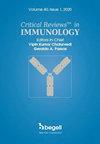Diagnostic and Prognostic Value of Peripheral Neutrophil CD64 Index in Elderly Patients with Community-Acquired Pneumonia
IF 0.9
4区 医学
Q4 IMMUNOLOGY
引用次数: 0
Abstract
Community-acquired pneumonia (CAP) is a leading cause of hospitalization and mortality in the elderly. The peripheral blood neutrophil CD64 (nCD64) index is increasingly recognized for its association with poor pneumonia prognosis. A comprehensive investigation involving 128 elderly patients diagnosed with CAP, including 96 with non-severe CAP and 32 with severe CAP, from January 2020 to January 2021 was performed. The nCD64 index, CD4+, CD8+, C-reactive protein (CRP), white blood cell (WBC) count, procalcitonin (PCT), neutrophil (NEUT), and B lymphocyte count were determined using flow cytometry. Our findings reveal that patients with severe CAP exhibited significantly higher levels of nCD64 index, NEUT, WBC, CRP, and PCT. Intriguingly, lower CRP, nCD64 index, CURB-65 score, and PCT were associated with a higher survival rate. Notably, the nCD64 index demonstrated remarkable predictive efficiency for 28-d survival in CAP patients [area under the curve (AUC) = 0.907], surpassing other markers and even showing enhanced predictive power when combined with the CURB-65 score (AUC = 0.905). Furthermore, a negative association was observed between the nCD64 index and both CD4+, CD4+/CD8+ ratios, and B lymphocytes, highlighting its potential role in immune dysregulation. These findings underscore the critical importance of the nCD64 index in the early diagnosis, risk stratification, and prognostic evaluation of infections and immune responses in elderly CAP patients.社区获得性肺炎老年患者外周中性粒细胞 CD64 指数的诊断和预后价值
社区获得性肺炎(CAP)是老年人住院和死亡的主要原因。外周血中性粒细胞 CD64(nCD64)指数与肺炎预后不良的关系日益得到认可。2020 年 1 月至 2021 年 1 月期间,对 128 名确诊为 CAP 的老年患者进行了全面调查,其中包括 96 名非重症 CAP 患者和 32 名重症 CAP 患者。采用流式细胞术测定了 nCD64 指数、CD4+、CD8+、C 反应蛋白(CRP)、白细胞(WBC)计数、降钙素原(PCT)、中性粒细胞(NEUT)和 B 淋巴细胞计数。我们的研究结果表明,重症 CAP 患者的 nCD64 指数、NEUT、WBC、CRP 和 PCT 水平明显较高。耐人寻味的是,较低的 CRP、nCD64 指数、CURB-65 评分和 PCT 与较高的存活率相关。值得注意的是,nCD64 指数对 CAP 患者 28 天生存率的预测效果显著[曲线下面积(AUC)= 0.907],超过了其他标志物,甚至在与 CURB-65 评分(AUC = 0.905)相结合时显示出更强的预测能力。此外,还观察到 nCD64 指数与 CD4+、CD4+/CD8+ 比率和 B 淋巴细胞之间存在负相关,这突出表明了它在免疫失调中的潜在作用。这些发现强调了 nCD64 指数在老年 CAP 患者感染和免疫反应的早期诊断、风险分层和预后评估中的重要性。
本文章由计算机程序翻译,如有差异,请以英文原文为准。
求助全文
约1分钟内获得全文
求助全文
来源期刊
CiteScore
2.60
自引率
0.00%
发文量
14
审稿时长
>12 weeks
期刊介绍:
Immunology covers a broad spectrum of investigations at the genes, molecular, cellular, organ and system levels to reveal defense mechanisms against pathogens as well as protection against tumors and autoimmune diseases. The great advances in immunology in recent years make this field one of the most dynamic and rapidly growing in medical sciences. Critical ReviewsTM in Immunology (CRI) seeks to present a balanced overview of contemporary adaptive and innate immune responses related to autoimmunity, tumor, microbe, transplantation, neuroimmunology, immune regulation and immunotherapy from basic to translational aspects in health and disease. The articles that appear in CRI are mostly obtained by invitations to active investigators. But the journal will also consider proposals from the scientific community. Interested investigators should send their inquiries to the editor before submitting a manuscript.

 求助内容:
求助内容: 应助结果提醒方式:
应助结果提醒方式:


